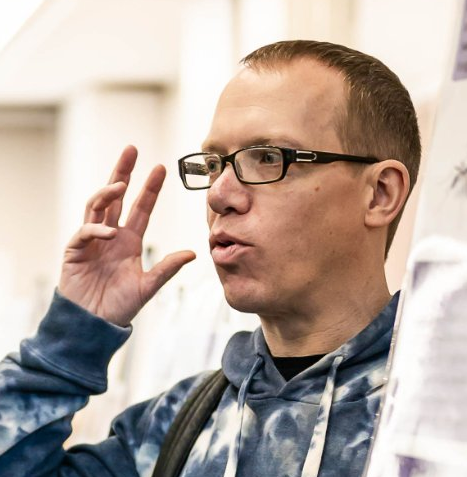Chris Marriott, Ph.D.

About
Degrees
Biography
Chris has been a faculty member at UWT since 2013. In his time at UWT he has been a leader in undergraduate education, winning the SET Outstanding Teaching Award in 2022. Chris is also a leader in undergraduate research with several publications in collaboration with undergraduate students.
In collaboration with Tom Capaul, Chris runs the local Puget Sound Programming Competition twice a year. University and high-school students from around Washington compete for fun and bragging rights. In addition, Chris and Tom also run the ICPC Pacific Northwest Region and have hosted regional contests at UWT since 2021.
Journal Publications
Marriott, C., Bae, P., and Chebib, J. (2022). Deterministic response threshold models of reproductive division of labor are more robust than probabilistic models in artificial ants. Artificial Life, 28(2):264–286.
Marriott, C., Borg, J. M., Andras, P., and Smaldino, P. E. (2018). Social learning and cultural evolution in artificial life. Artificial Life, 24(1):5–9.
Marriott, C., Parker, J., and Denzinger, J. (2010). Imitation as a mechanism of cultural transmission. Artificial Life, 16(1):21–37.
Marriott, C. and Watrous, J. (2005). Quantum arthur–merlin games. Computational Complexity, 14(2):122–152.
Conference Publications
Marriott, C., Abraham, M., and Dillon, H. (2023). Labor-based grading in computer science - a student centered practice. In ASEE 2023: American Society for Engineering Education Annual Conference.
Marriott, C. and Chebib, J. (2023). Domestication syndrome via indirect selection in simulated cereal grains. In ALIFE 2023: Ghost in the Machine: Proceedings of the 2023 Artificial Life Conference, pages 219–227. MIT Press.
Bae, P. and Marriott, C. (2019). Reproductive division of labor in a colony of artificial ants. In ALIFE 2019: The 2019 Conference on Artificial Life, pages 308–315. MIT Press.
DeMartini, S. and Marriott, C. (2018). Multilevel selection can lead to cooperation in a public goods game. In ALIFE 2018: The 2018 Conference on Artificial Life, pages 485–492. MIT Press.
Robertson, M. and Marriott, C. (2017). Role re-assignment and resource management in human organizations. In Proceedings of the 14th European Conference on Artificial Life 2017, pages 569–576. MIT Press.
Marriott, C. and Chebib, J. (2016). Modeling the evolution of gene-culture divergence. In Proceedings of the Artificial Life Conference 16, pages 500–507. MIT Press.
Marriott, C. and Chebib, J. (2016). Finding a mate with eusocial skills. In Proceedings of the Artificial Life Conference 16, pages 298–305. MIT Press.
Marriott, C. and Chebib, J. (2016). Divergent cumulative cultural evolution. In Proceedings of the Artificial Life Conference 16, pages 508–515. MIT Press.
Marriott, C. and Chebib, J. (2015). Finding a mate with no social skills. In GECCO ’15: Proceedings of the 2015 Annual Conference on Genetic and Evolutionary Computation, pages 185–192. ACM.
Marriott, C. and Chebib, J. (2015). Emergence-focused design in complex system simulation. In Proceedings of the European Conference on Artificial Life 2015, ECAL 2015, pages 234–241. MIT Press.
Marriott, C. and Chebib, J. (2014). The effect of social learning on individual learning and evolution. In Artificial Life 14: Proceedings of the Fourteenth International Conference on the Synthesis and Simulation of Living Systems, pages 736–741. MIT Press.
Marriott, C. and Gershenson, C. (2011). Polyethism in a colony of artificial ants. In Advances in Artificial Life, ECAL 2011: Proceedings of the Eleventh European Conference on the Synthesis and Simulation of Living Systems, pages 498–505. MIT Press.
Marriott, C. and Watrous, J. (2004). Quantum arthur-merlin games. In CCC ’04: Proceedings of the 2004 Conference on Computational Complexity, pages 275–285. IEEE.
Workshop Publications
Marriott, C. and Chebib, J. (2016). The Dual Inheritance Model. In Workshop on Social Learning and Cultural Evolution.
Marriott, C. (2017). Social Learning in Non-Human Animals. In Workshop on Social Learning and Cultural Evolution.